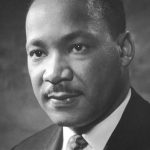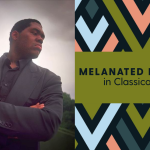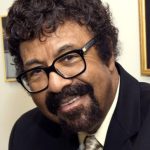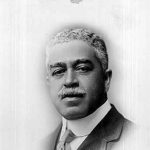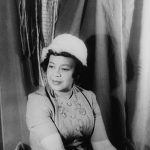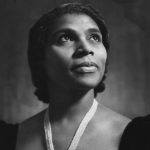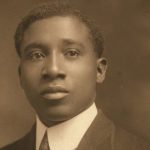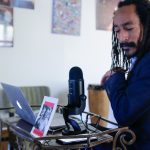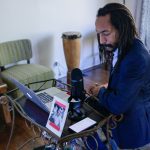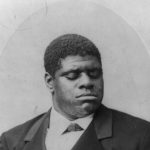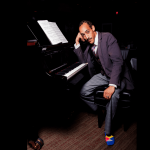Melanated Moments, S2E5: The Accidental Activist – Marian Anderson
In this episode, Angela enlightens us about a performer she refers to as an “accidental activist.” Marian Anderson was an amazing and groundbreaking performer who used her talents to blaze a trail and help move our country and world toward a more equitable future.
Featured Music:
“My Country ‘Tis of Thee (hymn),” performed by Marian Anderson
“Deep River,” by Harry Burleigh, performed by Marian Anderson
“Ave Maria,” by Charles Gounod, performed by Marian Anderson
Music Plays (00:05): [MMCM Theme] Angela Brown (00:15): Hey there, I’m Angela Brown… Joshua Thompson (00:18): And I’m Joshua Thompson… Unison (00:20): And this is Melanated Moments in Classical Music. [Laughter] Angela Brown (00:27): Oh, Josh! We have been having a wonderful time presenting to some and introducing to others, musicians, singers, conductors, arrangers, composers who have been giving it to us with music that is for, by, and about Black people. Joshua Thompson (00:46): Yes ma’am. And I’m sure that what you have on the docket for us today will be just as riveting and compelling as some of our other episodes. Angela Brown (00:54): Baby, you are right about that! Today, Joshua, I’m going to take us back in time to when being free was not so free at all. Joshua Thompson (01:05): Hmmm… Angela Brown (01:06): Mmhmm… We will be diving into the life and times of– who I like to call– an accidental activist, Marian Anderson. Joshua Thompson (01:17): I’m gonna have to slow you down just a little bit– accidental activist. So what are we talking about? You mean, like, civil rights activism? Angela Brown (01:25): Yes. You know, her career blossomed during the thirties where she and many other Black musicians were treated unfairly or barely given opportunities to showcase their talents to a non segregated audience. Joshua Thompson (01:41): And that I understand. So, why do you call her an accidental activist? Did she not start out as someone that was originally fighting for her rights to perform and have equal rights to do so? Or… Angela Brown (01:53): Just ‘what’, huh? Unison (01:55): [Laughter] Angela Brown (01:55): Well, I will say yes and no. Let me explain: Marian Anderson’s personality was not one that would push herself into a room and shout, ‘I’m here! I ain’t going nowhere, and deal with it’. No, she was a woman of great humility and grace. She was before Martin Luther King, so her activism was a little different. She broke barriers by being great and excellent in her chosen profession, but at times even that was not enough to even the field. Okay, let me give you and the people a glimpse into the life of Marian Anderson. Joshua Thompson (02:41): Yes, please do! Angela Brown (02:42): Born on February 27th, 1897 in Philadelphia, Anderson earned the name ‘Baby Contralto’ when she joined the Union Baptist church choir at six years of age. Marion loved to sing and the church would hold concerts for her and would often collect monies for her to take singing lessons privately. As she grew older, she wanted to attend a special school in Philadelphia, where she could really learn how to study music. The school was holding auditions, and she stood in line for hours with all the other applicants, who happened to be white, and she waited her turn. After everyone was waited on, Marian stepped up to get her application to audition. The young lady, who happened to be white, that was sitting behind the desk looked at her and said, ‘Oh, what do you want?’ And Marian said to her, ‘ I want to audition for the school’. Then the young girl said, ‘We don’t take Colored’. And this was the first time the young Marian Anderson faced racism, but honey, it would not be her last. Joshua Thompson (04:03): Not even close, right? Angela Brown (04:05): Not even close. I mean, because it says in her book that she was really distraught by the way this young woman spoke to her, because she was so young! And to say those words, ‘We don’t take Colored’ with such vitriol and hatred at such a young age really set her back. But she learned to persevere, and she kept going. As time passed, Marian continued to concertize and take lessons privately. Then she had the opportunity to travel overseas to study and sing, because it was just easier for her to go overseas. And she was more accepted there. Joshua Thompson (04:48): She’s one of many who does that– Angela Brown (04:48): Oh yes! Joshua Thompson (04:50): Right? Like your Josephine Bakers and– you know, a lot of folks at this time are doing that, what she’s doing: to study to learn and perform. So yes, don’t let me interrupt you Angela. Keep going baby! Angela Brown (05:03): [Laughter] There, she would hone her skills and become quite popular with European audiences. Now, don’t think that Europe didn’t have racism ’cause it did exist, but it was nothing compared to what she and others had endured in the U.S. So she was the toast of Europe, okay. Going around singin’ and performin’, you know, being accepted, feeling comfortable, learning her languages, really learning how to use her voice. And the great Italian conductor, Arturo Toscanini, came to one of her concerts, and he came back to see her after the concert. And he said to her, ‘Darling, your voice is one heard once in a hundred years’. Joshua Thompson (05:55): And wasn’t it the– right, right– a famous composer, a famous conductor, and isn’t that where the, ‘The Voice of a Century’– or ‘The Century’, came from, right? For her. Angela Brown (06:03): Exactly, she was coined with that phrase. Joshua Thompson (06:06): Sure. Angela Brown (06:06): She was coined with that phrase! She was fantastic. But Marian knew, now, that she’s going to have to come back home at some point. And you can imagine being in a place where they accept you, and you can feel comfortable to be who you are and to express yourself artistically and not have to worry about– necessarily– worry about your personal being as well as your emotional being. Joshua Thompson (06:36): Right, right. Angela Brown (06:37): And just being Black! You know, uh– Joshua Thompson (06:39): It’s that simple enough: just be! [Laughter] Angela Brown (06:39): — And then have to think about coming back home to where you were not accepted, you were still considered a–not even a whole person, you know? Um, but she came back home, and her fame, now, was not– had not gone unnoticed with the American audiences. But after all, she was still Black, and that had its limitations in America. Joshua Thompson (07:09): Right. Right. Angela Brown (07:10): So, she came home and embarked on a concert tour that was segregated, okay. Back then, they had audiences– the balcony was for Black audiences, and the main level– or the orchestra level was for white audiences. If the hall was split down the middle, Black people sat on one side, white people sat on the other, and she hated– absolutely hated to perform for audiences like that. There was one concert that she did, that after she sang and she was accepting her applause, she turned to the white audience and graciously accepted their applause and bowed. But then, she turned to her Black audience and she gave a gracious, deep diva swan dive bow to let Black audience know that she, too, was with them. And she was one of them because she had to deal with the same stuff they was dealing with. Joshua Thompson (08:14): Sure! And I can imagine, at that time, that’s a very bold statement to make, right. As we would say, she was being shady, and I’m here for it! She was a little shady, right? For her time. Angela Brown (08:26): [Laughter] Well…she was being graciously…shady. You know, because like I said, she didn’t, she didn’t march down with signs and pickets and ‘Let my people go’ kind of thing. But the way she did it on stage let them know. Joshua Thompson (08:42): Yes. Angela Brown (08:43): So in 1939, during the era of racial segregation, the Daughters of the American Revolution, the DAR, refused to allow Anderson to sing to an integrated audience in Constitution Hall in Washington, DC. Now mind you, they allowed Black performers to perform for segregated audiences, but not integrated audiences. She refused to sing there unless she could sing to an integrated audience, but they denied her request. That incident placed Anderson in the spotlight of the international community, on a level unusual for a classical musician. Now, with the aid of– now, she was in some big time, good company– Joshua Thompson (09:35): She was rubbin’ the right elbows at some point in time, okay! Angela Brown (09:37): She was rubbin’ the right elbows! Because– Joshua Thompson (09:38): Okay, okay. Angela Brown (09:38): She had– like I said, her talent had not gone unnoticed to the American public. With the aid of First Lady, Eleanor Roosevelt, and the President of the United States, Franklin Delano Roosevelt, Anderson was able to perform a critically- acclaimed, open air concert on Easter Sunday, April 9th, 1939 on the Lincoln Memorial steps in the Capitol. She sang before an integrated audience of more than 75,000 people and a radio audience in the millions. And one of the songs that she sang was ‘My Country, tis of thee, sweet land of Liberty’. Then she took the liberty to change the words! Joshua Thompson (10:31): [Laughter] Angela Brown (10:31): And she said ‘to thee we sing’, because she no longer wanted to see the duality America. She wanted us to be United as an American people. Joshua Thompson (10:46): I gotchu. So– and I love how you bring up this distinction, ’cause now this is twice that she is being ‘professionally shady’. This was how– she knows how to be an activist in her gifts, right. And it’s an iconic, still image, but let us, like you said, listen to it with that information in mind. And maybe it helps us hear it a little bit differently and a little bit deeper. Franklin D. Roosevelt [Recording Audio] (11:14): “Genius draws no color line. And so it is fitting that Marian Anderson should raise her voice in tribute to the noble Lincoln, whom mankind will ever honor. Miss Marian Anderson!” Music Plays (11:26): [Samuel Francis Smith’s “America (My Country, ‘Tis of Thee),” sung by Marian Anderson] Joshua Thompson (12:26): Just a stunning performance. I’m gonna to step back just a bit, let you propel the story a little bit further, ’cause you’ve got a couple other selections that I do have questions about. So let me get on out your way. I’ll get out your way and let you go on for it! Angela Brown (12:37): Alright then, boo. [Laughter] Now in 1955, Anderson became the first African-American to sing in an opera at the Metropolitan Opera in New York City. Now you might say, ‘Why did it take so long for the MET to recognize her talents and to offer her an opportunity to sing’? Well, we were still in a segregated notion and someone had to have the light bulb come on, okay. Joshua Thompson (13:06): Sure, sure. Angela Brown (13:06): But, I will say that Marian Anderson never saw herself as an opera singer because she didn’t feel like she could act, m’kay? Joshua Thompson (13:18): Oh! Angela Brown (13:18): Early on in her career, she had had the opportunity– maybe not at the MET, but other places to perform opera. But she just didn’t feel comfortable with her acting skills. So she opted just to do leider and song recitals, um, and recitals were heavy with leider, um, art songs, and spirituals. And so, when the MET came a-callin’– and in 1955, now mind you, she was born in 19 –1897, now. She was a little long in the tooth, maybe a little past her prime, but she did do the role of Ulrica in ‘Un Ballo in Maschera’ at the Metropolitan Opera in 1955. And so she did break the color barrier there. And then she went on in 1963– She sang as a part of the March on Washington for jobs and freedom, in which Martin Luther King Jr. made his famous ‘I Have A Dream’ speech. Now, she sang again on the steps of the Lincoln Memorial, where she had sang in 1939. Now– this little fun fact: Martin Luther King was ten years old when he heard Marian Anderson sing on The Steps in 1939, on the radio. So now, it’s his turn to… Amass, um, a great congregation of people, you know, uh, and it was just befitting to have the accidental activists and the activists to converge together. And he wanted her presence to be there, to really solidify her role in civil rights history. Joshua Thompson (15:14): I just think that is absolutely fascinating. I had no idea, right? And it takes you right back to a ten-year-old Martin Luther King, whether he knows it or not, is listening to the music and the inspiration that is going to catapult him to historic levels! And she doesn’t even know that either, right? I just think that’s such a really wonderful way– how the universe and shared causes really do have a trajectory that feed off each other. That’s just– that’s fascinating to me, absolutely fascinating. Angela Brown (15:44): Exactly! And I just want to play a couple of pieces that were her mains stays because, like I said, she did concertize throughout Europe and America, and she did a lot of religious and unreligious art songs. So the first one I want to play is ‘Deep River’, and the second is ‘Ave Maria’. Music Plays (16:14): [“Deep River,” sung by Marian Anderson] Angela Brown (19:01): Ooh, honey! Joshua Thompson (19:03): Beautiful, beautiful. Angela Brown (19:04): Did you hear that cream in that voice? That breath control? I mean, had she been in her prime and had the confidence in being an opera singer, I could hear her doing roles like Eberly in ‘Don Carlo’. I could hear Azucena in ‘il Trovatore’. I could hear Amneris– because she’s got some highs, ’cause Amneris is a high mezzo– Joshua Thompson (19:39): Right? Angela Brown (19:41): I mean– in Aida? She would have been tearing the place up! Joshua Thompson (19:44): [Laughter] Right! Angela Brown (19:44): But she was someone that just was born before time that she would have been accepted. Joshua Thompson (19:53): I love the piece, you know, and for me– or maybe it’s just me, I think we’re so accustomed to hearing this done with the low baritone, or at least I am, in a lot of the arrangements. So hearing her, I was just so struck by the diction. Angela Brown (20:09): Oh, yes! Joshua Thompson (20:09): You know? She’s stretching out these syllables and– deep rivers, like yeah. How deep is this, is this river here? ‘Cause she’s takin’ her time in it, right? She’s showing the depths of it, without being in a hurry, and really taking her time. And it just, um… It makes it something that you really have to sit deeply in and listen to it and just let that wash over you. And she does such a beautiful job with it. I, um, I love it. Angela Brown (20:36): Yes. And you can see, even though she was not afforded the opportunity to have a classic education, by her going away to Europe and having some private lessons here in the States and abroad, she still came out being able to have good breath support, diction. That voice was lined up! It was beautiful. And it just goes to show you that if there is a will, there’s a way. And if you want it, you can do it. Joshua Thompson (21:11): I agree. You’ve got another one for us though, right? Angela Brown (21:13): Yes. Let’s listen to– Oh, I’m torn. I’m torn! Let’s listen to ‘Ave Maria’, which was one of her calling cards. Music Plays (21:29): [“Ave Maria,” sung by Marian Anderson] Angela Brown (26:01): [Sings] Yes! Joshua Thompson (26:01): I feel so relaxed right now, do you? Angela Brown (26:04): I was just reveling in her beautiful German diction because that was something that dogged her early on in her career, before she really got a chance to get it all together and have all of that training and have everything just put together. She got a really bad review in America, and they spoke of her not having very clear, good diction, and that bothered her. And she stopped singing for about a year after that bad review, and then she went to Europe and things started poppin’ for her! And then she came back and baby, you take a lump of coal and you put pressure on it, baby, it will become a diamond! And sistah went over to Europe and got her facets. So she came back shiny– bright, shiny! So, you know, I enjoyed that. Joshua Thompson (26:59): So, in kind of speaking with that, bringing the story back to light too– you’re a part of a documentary on this classical music legend anyway, right? I was not gone let you get away without throwin’ some shine on your TV career, honey. I’m not gonna let you do that. You know better! Angela Brown (27:12): [Laughter] Yes! You know, Joshua, it’s entitled ‘Voice of Freedom’ and it can be found on any of your PBS outlets. But [on] pbs.org, you can definitely see this on demand. So I was very proud to be a part of that project and being able to shine a light, a bigger light, on Marian Anderson. Before we go, Joshua let’s listen to one more piece that actually was sung at the Lincoln Memorial concert that she did in April of 1939, but it– mysteriously, I don’t know how– but it was cut from anything that you’ve seen! But it is ‘My Soul’s been Anchored in the Lord’ by, another little known African-American woman composer by the name of Florence Price. Music Plays (28:05): [Florence Price’s “My Soul’s Been Anchored in the Lord,” sung by Marian Anderson] Angela Brown (29:51): Woo, yes! Thank ya, Marian Anderson! For allowing us to experience your beautiful, beautiful voice. Thank you for your spirit of activism! Even though that’s not what you started out doing, you just– honey, marched on with excellence on stages of the world, and we appreciate you! So until next time, I’m Angela Brown… Joshua Thompson (30:14): I’m Joshua Thompson… Unison (30:16): And this has been Melanated Moments in Classical Music. Joshua Thompson (30:24): Season Two of Melanated Moments in Classical Music was made possible by the Indianapolis Foundation, a CICF affiliate. We thank them for their generous support. Angela Brown (30:36): Melanated Moments in Classical Music is proud to partner with The Coalition for African-Americans in the Performing Arts and Morning Brown Incorporated. Joshua Thompson (30:46): Melanated Moments in Classical Music is a production of Classical Music Indy. Our producer is Ezra Bakker Trupiano. Our theme music was composed by Laura Karpman.
[/su_tab] [su_tab title=”Related Blog Posts” disabled=”no” anchor=”” url=”” target=”blank” class=””]LOCAL CLASSICAL – MELANATED MOMENTS SEASON SIX
As we continue celebrating Black Music Month, this week’s playlist will feature music and artists discussed during the latest season of Melanated Moments in Classical Music. All of season six was recently released and featured vibrant discussions about artists such as Scott Joplin, Hazel Scott, Joseph Bologne, and Kenneth Overton, among others.
LOCAL CLASSICAL – BLACK MUSIC MONTH
In this week’s playlist, we celebrate Black Music Month which takes place in June. It was created by President Jimmy Carter in 1979 to honor and celebrate Black artists’ contributions to music. We’ll be honoring the late Herman Whitfield III, an Indianapolis native who was a gifted pianist and composer. We’ll also hear performances of artists who have been featured in season four of Classical Music Indy’s podcast, Melanated Moments in Classical Music.
LOCAL CLASSICAL – MELANATED MOMENTS
In this week’s Black History Month playlist, we bring you recordings by composers, performers, and artists who have been highlighted in our podcast, Melanated Moments in Classical Music. Melanated Moments is the ward-winning podcast from Classical Music Indy that shines a spotlight on musical works composed by, for, and about Black people.
LOCAL CLASSICAL – HOST OKARA IMANI
Hey, Starshine! This is Okara Imani, Media Production Fellow for Classical Music Indy, and your guide to The “I” in Classical Music. I’m here to highlight the cultural and social intersections of the classical art form, beyond the Classical Period and beyond the constructs of Euro-centric high society origins.
Ric’key Pageot: Inspiring a Moment to Learn, Acknowledge, and Respect
Ric’key Pageot: Inspiring a Mo …
Ignatius Sancho: Composing the Hypocrisy of Colonialism & Convention
Ignatius Sancho: Composing the …
NEW CLASSICAL – DR. BILL BANFIELD
This week we bring you the music of Dr. Bill Banfield. Dr. Banfield is an award-winning composer whose symphonies, operas, chamber works have been performed and recorded by major symphonies across the country. Few have a wider, performed professional composing output, that has had public concert performances, reviews, radio, recordings of some 12 symphonies, 7 opera, 9 concerti, chamber, jazz, and popular forms. This alone making Dr. Banfield one of the most performed, recorded composers of his generation. In 2010 and 2016, Dr. Banfield served as a Pulitzer Prize judge in American music.
#AmplifyMelanatedVoices
Classical Music Indy stands with our Black community. We are here to listen, learn, and lend our support. We believe that classical music is powerful; that it evokes a range of human emotions and creative expression.
Angela Brown Brings her Unbridled Zeal to a New Podcast.
Angela Brown brings her unbrid …


